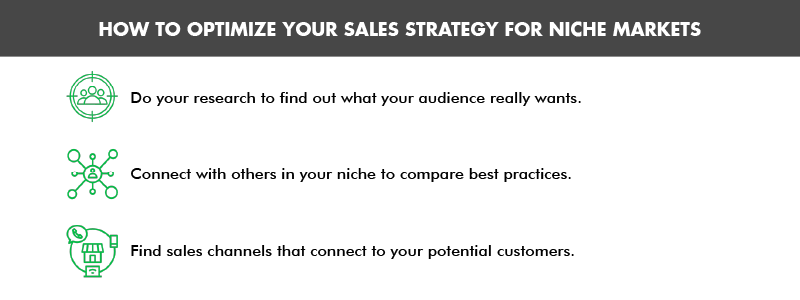How to Optimize Your Sales Strategy for Niche Markets

Grabbing a big piece of a small market requires a lot of hard work and finesse.

Business owners generally want their products or services to reach as wide an audience as possible, but sometimes success lies in appealing to smaller, niche markets. If this sounds familiar – if you find yourself targeting more selective audiences who are a precise fit for your offerings – you’ve no doubt learned that attracting their interest requires a refined sales approach.
Niche markets not only help you focus on your core strengths as a company, but also put you in a position to be the brand of choice for customers most likely to buy. Below, we’ll walk through how to effectively tailor your sales strategy to appeal to your niche, giving you the tools and knowledge to bring more fans into the fold and grow your business.
Research, research, research
With fewer potential buyers who fit your target audience, it pays to get to know them as intimately as possible. Who is your ideal customer? How old are they? Do they have kids? Where do they live, work, and shop? What is their buying cycle and buying power? What aren’t they getting from your competitors? The more detailed your answers to these questions are, the better chance you have of providing what niche customers want.
Start by researching trends in your industry and positioning your company to get in front of them. What are your potential customers talking about right now? What occupies their minds and imaginations? This may seem like a daunting task at first, as it forces you to predict the future rather than just relying on data from the past. But here are a few simple strategies to help:
- Talk to others in your niche. Healthy competition can be a good thing, particularly when you can stay in touch with other businesses that face similar challenges.
- Go to trade shows. Nearly every industry has conferences, trade shows, or other events where companies gather and exchange knowledge—yours is likely no exception. The experience can be invaluable, particularly if you’re new to your particular niche.
- Read trade publications. Magazines, blogs, and social media influencers within your niche can be an invaluable resource for keeping up to date on the latest trends and news. Influencers, especially, often drive trends (it’s in the name!), so it’s a good idea to pay close attention to what they’re saying.
You’ll also need to do a thorough analysis of your target audience. After all, you need to know what they want before you can provide it. Here are some tips for getting to know them:
- Talk to your ideal customer. If there’s a specific group of people you’re targeting, ask them what they need and what they see happening out in the world. Don’t be afraid to bring up your competitors. Find out what they like and don’t like about other companies in your niche. This can help highlight areas where your business can differentiate itself.
- Spend some time on social media. This has become the most direct way to hear and see what people in your niche are saying about current trends and how other companies are meeting their needs – or missing the boat. Be prepared for direct, honest feedback, which can sometimes cut both ways, but is essential for understanding what your ideal customer wants.
- Keep up on industry reports. Whether it’s a dispatch from a market research firm or an update from a trade association, industry reports can show whether your specific niche is on the rise, dipping down, or sitting there stagnant. Plus they often highlight what’s working, what isn’t, and what’s coming.
Overall, niche research can clarify why your audience prefers (or doesn’t prefer) your brand and help you develop data-driven strategies for capturing more of the market.
Demonstrate your value proposition
Once you’ve done the research, you then need to demonstrate to your niche audiences that your product or service has intrinsic value – that it will directly help them in some way. Here’s where you have the opportunity to show potential customers your value proposition, your price point, and anything else that might drive their decision to buy.
Once you’ve proven that your product or service fills their needs, your target audience will be much more likely to listen to your sales pitch and engage with your business.
Find sales channels specific to your niche
Every business needs a sales channel strategy. The top companies in your niche likely already use many different channels to speak to their audience. So how do you find channels that will really work for you? Start by finding out where your target audience and your competitors spend most of their time, and then determine which channels are within your budget.
Different sales channels also require different strategies to really be effective. If you’re trying to get customers to your brick-and-mortar retail shop, you’ll use a very different set of incentives than you would to drive traffic to an online store.
Here are some of the most commonly used sales channels:
- Online store. It lets you design everything, down to the last detail. You customize the experience, creating the least possible distance between you and the customer.
- Traditional marketplace. These include Etsy, Amazon, and eBay, to name a few. These channels offer a wide variety of products all in one place.
- Modern marketplace. These are content-driven platforms that also offer purchasing opportunities. This includes many social media apps such as Facebook. Instagram, TikTok, and Pinterest, as well as streaming services like Spotify. These platforms have been successful because they can put related products and services directly in front of customers who are already there to engage with the content.
- Retail. This includes pop-up shops and traditional, permanent stores, whether it’s a stall at the local farmers market, a craft fair booth, or a rental in the mall. More than any other channel, retail allows you direct, in-person contact, which can really make a difference in some niches.
- Mobile apps. By 2025, sales on mobile devices will make up more than 10% of all retail sales in the United States. Mobile apps offer a great opportunity to create a fun and engaging sales experience with coupons, brand shopping, and gamified experiences.
- Partnerships. This entails bringing on an outside professional or company to work with you. Social media influencers who promote products through influencer marketing are one example. The influencer gets cheaper products (or a commission), and the company gets the influencer’s reach and fan base.
No matter which channels you use, they need to work together. Perhaps most of your sales come from your website, but a small band of loyal folks feel a connection with Instagram Stories. Don’t limit yourself to a single channel, or you risk losing precious customers.
Attend a niche event
Niche conferences and trade shows are great places to connect with potential clients, as they are packed with the targeted communities you want to reach. Particularly if you’re new to your niche, these events let you more fully explore different demographics, pitch to untapped markets, and dive into the passion and expertise of others.
Some examples of events worth considering:
- Technology conferences. These are great for up-and-coming technologies like AI, VR, cybersecurity, or blockchain.
- Food and beverage festivals. If you’re in the hospitality space, these culinary gatherings connect you with people of similar dietary preferences, regional bases, and equipment needs.
- Wellness retreats. Holistic events that feature workshops on topics like self-care and nutrition and offer classes in yoga or Pilates, meditation, or spa treatments.
- Sustainability events. These combine for-profit eco-businesses, non-profit activist organizations, and people who generally want to make a difference for the planet.
Niche events present an amazing opportunity to expand your customer base by hanging out with fellow obsessives who are open to new and exciting things.
Let MetaGrowth help find your niche
Being different isn’t always a bad thing – especially when it comes to niche sales. When you do the work of researching your niche market and understanding what makes it tick, you’re on your way to a game-winning strategy.
If you’d like to help your sales team exceed expectations in your specific niche, turn to the experts at MetaGrowth Ventures. We can help you recruit, hire, and train the world-class sales team of your dreams – one that can master your niche and take your business to new heights. Contact us today to find out more.
Written by
Josh Hirsch
